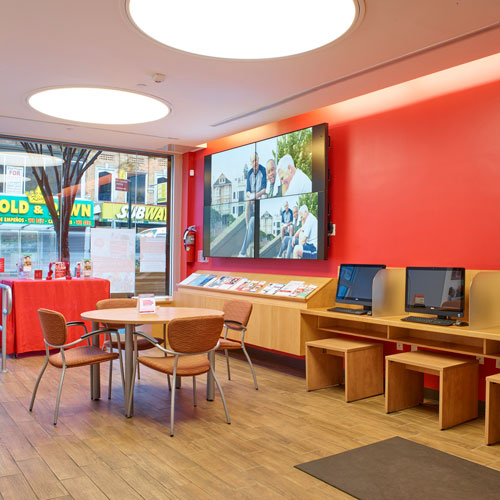
Eddie Torres’ career in corporate real estate is a case study in making the best of the opportunities that life brings. Torres is currently the property manager with Mountain Development Corporation, a full-service real estate firm with more than 3.8 million square feet of data center, industrial, office, and retail tenants in the northeastern United States. He’s honed his skills over two decades in real estate management positions with a half dozen companies, each of which has taught him a slice of the skill set that he brings to the table today.
Torres is a results-oriented executive, but he didn’t get to where he is by being hard-edged and unscrupulous. Soft-spoken and polite, Torres says he likes to teach by example.
“In order to be successful, you need to have a good team,” he says. “And in order to have a good team, you need to be transparent and you need to give your team the tools that they need in order for them to be successful.”
Of course, giving your team the tools they need means first acquiring those skills yourself. For Torres, it all started in the mid-1990s at Act Media, a promotion company, in its facilities department. A short time later, he landed his first managerial position, working at Oxford Health Plans at a time when the company was experiencing rapid growth. Torres was responsible for the company’s office in White Plains, New York, where he oversaw facilities, maintenance, and security, while “building out a new floor every four months” to accommodate expansions in Oxford’s medical insurance and nursing business units. There was plenty to learn concerning construction processes, health-care industry protocols, and vendor contracts, but Torres also learned how to cope with the potential vagaries that are part of a dynamic industry. Just five years after joining the company, Oxford started to break apart, selling off some of the same businesses that had been acquired a few years earlier.

“We started closing floors, just as quickly as we had built them,” Torres says. He was offered a position to stay within the restructured company, but saw the writing on the wall.
“I saw that everybody was either being let go or was being transferred somewhere else,” he says. “I didn’t see a future for myself, even though they wanted to keep me there while they were doing all these reductions.”
Torres reached out and found a position with another company where he could learn something new and be part of a vital team. So his career has gone over the years, always moving toward the work that felt most purposeful and never staying so long in one company that he would risk feeling stagnant. Getting comfortable with your co-workers and seeing projects through to completion is one thing—getting stuck in a rut is another.
Pieces of the Portfolio
Torres’ top three projects since joining Mountain Development Corporation
Five-Story Parking Garage Restoration (Stratford, CT)
- Restored all perimeter, vertical, horizontal, ‘T’, drain and pour slab joints, which were beginning to fail
- 5,500 square feet
- $245,000
- Completed in July 2015
Heat Pump & Boiler Replacement (various locations)
- Maintenance program replacing 7 heat pumps and 2 boilers per year
- Affects 175,000 square feet annually
- $125,000/year
- Ongoing
Parking Lot Repaving and Landscaping (Milford, CT)
- 12,500 square feet
- $250,000
- Completed July 2015
He worked in several industries, including a stint at XL Insurance, where he was responsible for 78 offices throughout North, Central, and South America and helped to rebuild part of the First Financial Center (a skyscraper across from the World Trade Center in New York City) after the 9/11 attacks. There always were common threads of construction, facilities management, lease negotiation, maintenance, and security—all skills that he has mastered at this point, allowing him to be a skillful orchestrator of the workflow of those who report to him.
“I’m a very hands-on person,” Torres says. “I like to be involved in every project that is in process, from the development stage to execution.”
One of the skills Torres is most passionate about is design, an arena that is crucial to success in the industry. He joined WWE, the wrestling entertainment company, just as they announced plans to establish their own TV network in 2009. His job was to build the infrastructure needed for this massive expansion effort, for which he spearheaded the design approach. He opened new offices in Miami and Atlanta and doubled the square footage of existing offices in New York and Los Angeles. With each, his goal was to integrate the company brand into the design. “Each office that I visited had no brand whatsoever,” says Torres. “The furniture was old and when you walked into the space it felt like you were walking into a 1970s office building. There were no open areas, no communal places for people to gather.”
In addition to integrating the WWE brand, his idea was to give each new space a visual identity that corresponded to its role within the company. WWE’s LA office, for example, now has décor inspired by the movie business. At the corporate headquarters in Stamford, Connecticut, the finance division has a “money in the bank” theme. The lobby floors have wrestling rings and stage themes and the main boardroom has red leather, black glass walls and gray-striped hanging lamp fixtures designed to resemble owner Vince McMahon’s famous pin-striped suits. “Everything was detailed to be brand specific,” says Torres.
These days, Torres directly oversees about 1.5 million square feet of real estate—the company’s entire Connecticut portfolio— for Mountain Development Corp., and also delivers strategic and tactical support for all 3.8 million square feet of the company’s portfolio. He’s been there less than two years, but has been busy coaxing his team into a well-oiled machine. Torres prefers to hire additional staff, when appropriate, to cut down reliance on outside vendors. He also believes in having all the managers under him cross-trained so each can fulfill the roles of the other when called on to do so. “That way, when we need vacation coverage or we have an emergency, I don’t have to struggle looking for someone that can come and help me,” he says. “I have the in-house staff already trained to cover on a moment’s notice.”
When asked what his colleagues most admire most about him, his modesty kicks in, but he says that “although I have a lot of experience getting things done, I think I have a high-end skill set in planning … clearly communicating goals, expectations and budgets up front helps everybody achieve a common goal.”


